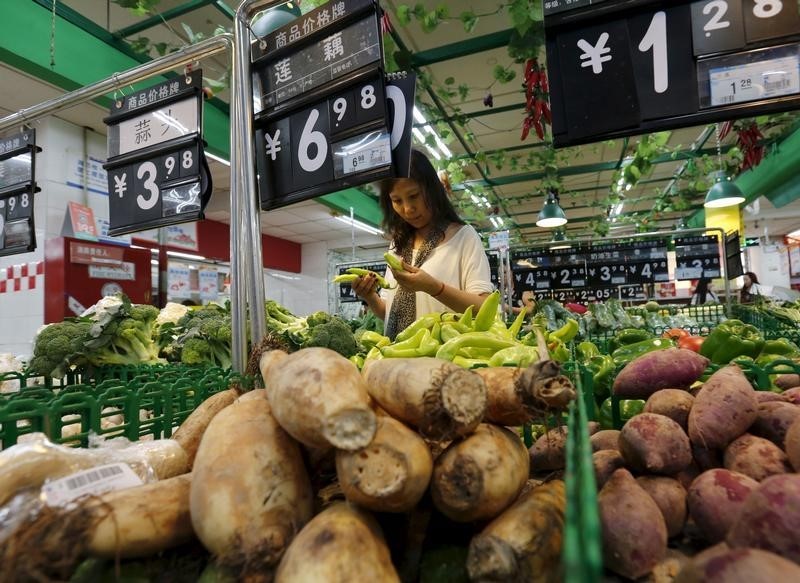BEIJING (Reuters) - Consumer inflation in China cooled more than expected in September while producer prices extended their slide to a 43rd straight month, adding to concerns about deflationary pressures in the world's second-largest economy.
The consumer price index (CPI) rose 1.6 percent in September from a year earlier, the National Bureau of Statistics (NBS) said on Wednesday, lower than expectations of 1.8 percent and down from August's 2.0 percent.
In a sign of sluggish demand, the non-food CPI was even milder with an annual growth rate of 1.0 percent in September, the NBS data showed.
The easing CPI was mainly due to a high comparison base last year, Yu Qiumei, a senior NBS statistician, said in a statement accompanying the data. CPI rose 0.5 percent month-on-month in September 2014, compared to a 0.1 percent growth last month.
Reflecting growing strains on Chinese companies from persistently weak demand and overcapacity, manufacturers continued to cut selling prices to win business.
The producer price index(PPI) fell 5.9 percent from a year ago, in line with the expectations and the same rate of decline as in August, which was the biggest drop since the depths of the global financial crisis in 2009.
"Overall, the still weak PPI highlights the severe overcapacity problem and sluggish domestic investment demand," said economists at Nomura.
"Given the lacklustre growth outlook, we continue to expect moderate fiscal stimulus from the central government and continued monetary easing."
Nomura expects one more cut to banks' reserve requirement ratio (RRR) late this year and another four in 2016, each by 50 basis points (bps), together with two more interest rate cuts of 25 bps each next year.
Stubbornly weak producer prices are threatening to erode firms' profits and add to their debt burdens, conditions which analysts expect to persist for the remainder of the year.
Weichai Power (HK:2338), China's largest manufacturer of engines for heavy-duty trucks used in mining and construction, warned on Tuesday that its nine-month net profit could fall 75-85 percent due in part to the weakening economy.
Still, with consumer inflation remaining well below Beijing's 3 percent target for the year, policymakers have ample room to unveil further support for the economy.
China has already launched a wave of measures since late 2014, including cutting benchmark interest rates five times since November, though some analysts say such moves have not been as effective as in the past when the economy was more tightly controlled, exports were strong and debt levels were much lower.
Trade data on Tuesday showed imports tumbled for the 11th straight month in September, weighed down by weak global commodity prices and soft demand, while exports fell for a third month, albeit less than expected.
Activity in China's factory sector shrank again in September as new orders dwindled, private and official surveys showed earlier this month. Those readings have fanned fears that the economy may be cooling more rapidly than earlier predicted.
The government is due to release September industrial output, retail sales and investment data on Monday, along with third-quarter gross domestic product (GDP).
Many economists expect July-Sept economic growth dropped below 7 percent for the first time since the global financial crisis.
